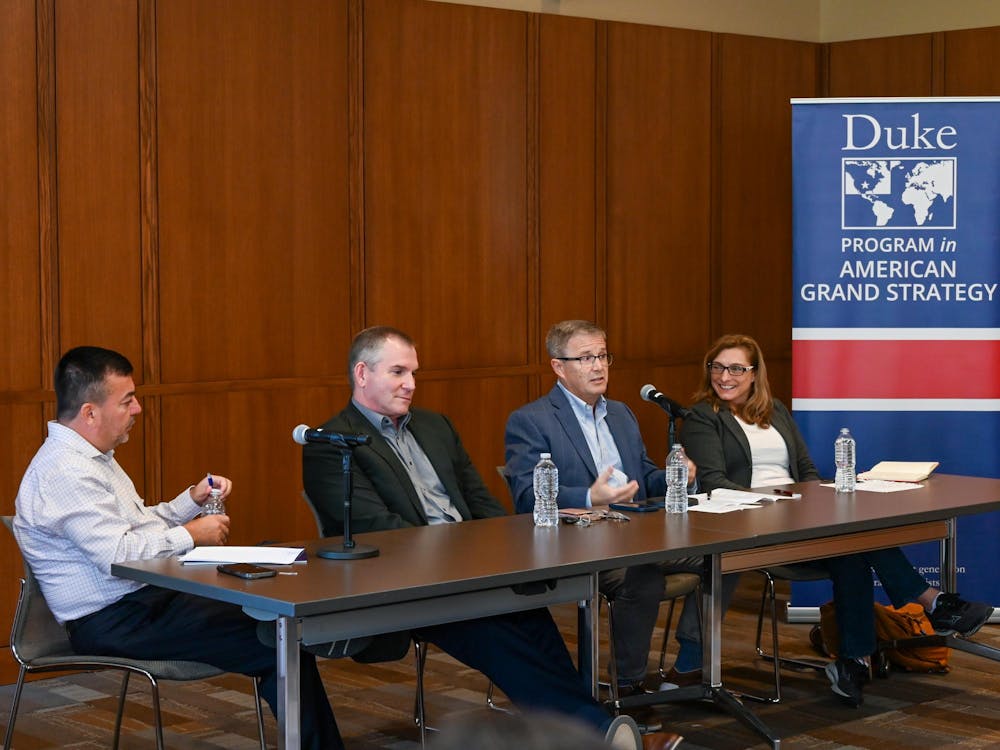Duke professors reflected on the results of the 2024 presidential election and spoke about Trump’s second administration during the “What now? Making Sense of the 2024 Presidential Election” post-election panel hosted by Duke's Program in American Grand Strategy Wednesday.
Panelists included Peter Feaver, professor of political science and public policy and director of AGS, Professor of Political Science Sunshine Hillygus and Frank Bruni, Eugene C. Patterson professor of the practice of journalism and public policy. The conversation was moderated by Abdullah Antepli, professor of the practice in the Sanford School of Public Policy.
The event was co-sponsored by Polis: Center for Politics, the DeWitt Wallace Center for Media and Democracy, the Office of Government Relations and the political science department.
In her first remarks, Hillygus discouraged making broad assumptions about voter blocs in the wake of the election, and instead emphasized “fundamentals” such as indicators of the economy and presidential approval.
“It is not only not constructive but it is also wrong to interpret the election as 50 percent of the population [being] racist, misogynistic, transphobic and stupid,” she said. “If we start with that point, then we are not only misinterpreting how our neighbors voted … but also really preventing looking at a path forward that is going to be successful.”
Later, when an audience member asked how to maintain friendships with people who voted across the aisle, Hillygus pointed out that just because someone votes for a candidate does not mean that they endorse every statement and agenda item of that candidate.
“It’s just important for us to focus on where we have similarities, where we can find bridges and how we can get there,” she said.
Outcomes of the next Trump administration
Feaver suggested that regardless of the makeup of Congress, if Republicans keep control of the House of Representatives, a “non-functioning majority” would render it difficult to pass certain legislation.
“I think that anything that requires Congressional action will be very hard to accomplish … passing the Trump tax cuts is going to be very, very hard,” he said.
Feaver added that recent Supreme Court decisions may have subtly “limited the regulatory state,” making it harder for the president to implement his agenda.
However, he suggested that domains of national security and foreign policy have the fewest limits on the president.
The panelists’ conversation surrounding foreign policy addressed the Russia-Ukraine conflict. Feaver predicted that it is “inevitable” that Trump will force Ukrainian President Volodymyr Zelenskyy “to make a cease-fire offer that is concessionary towards Putin.” He added that Ukraine being in the “strongest position” possible “by Inauguration Day” would improve how the country fares during the Trump administration.
Reflecting on the two campaigns
The panel also addressed how the two candidates’ campaign strategies may have played a role in Trump’s victory.
Bruni particularly harped on Harris’ response to a question asking her what she would have done differently in her campaign.
“[Harris] said ‘not a thing comes to mind,”’ he said. “[That answer] was, for me, the most shocking moment of her campaign.”
In the context of President Joe Biden’s relatively low approval ratings, Bruni stated that “the chief mistake of the Harris campaign was her inability — [and] seeming unwillingness — to really establish separation from President Biden.”
He also added that Harris’ late entrance into the race presented an additional challenge to her campaign.
“The circumstances of her candidacy were so difficult, even apart from the larger forces. She had 15 weeks to change her image or establish her credibility — outside of her stint as the vice president — with the American public, Bruni said. “… And she, of all the possible Democratic nominees, was going to have the hardest time establishing [herself] from a very unpopular incumbent.”
Get The Chronicle straight to your inbox
Sign up for our weekly newsletter. Cancel at any time.

Annie Eilers is a Trinity first-year and a staff reporter for the news department.

